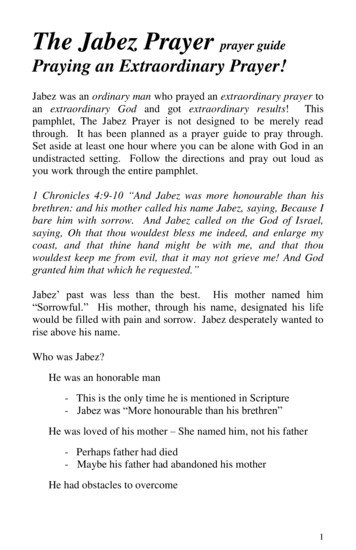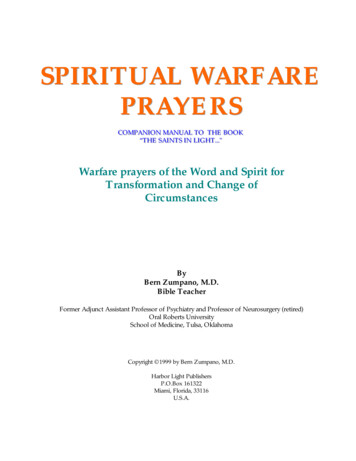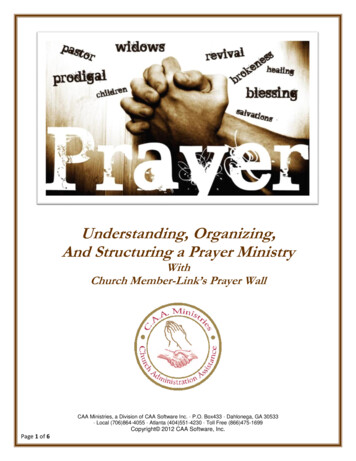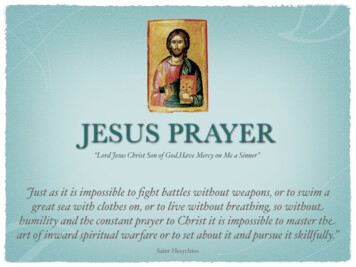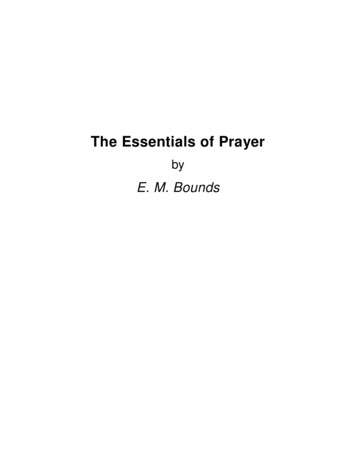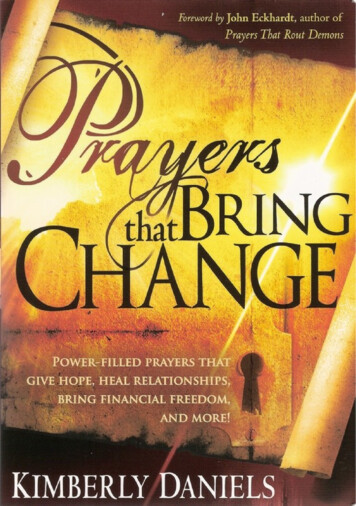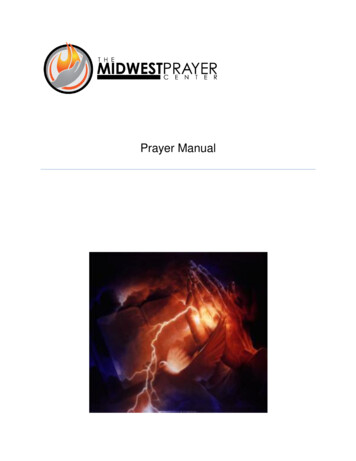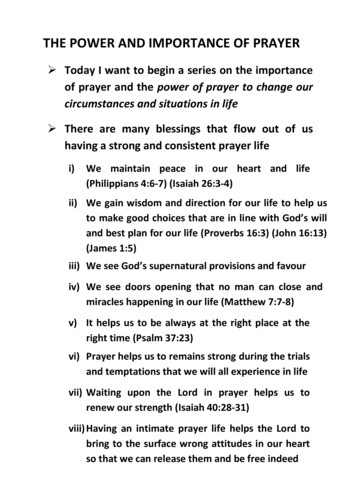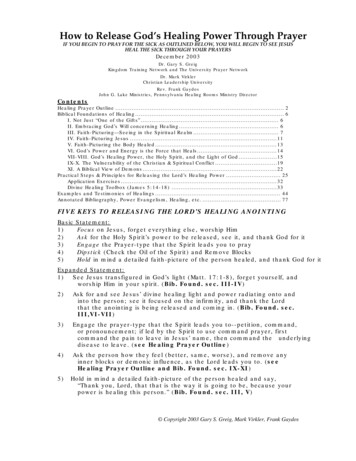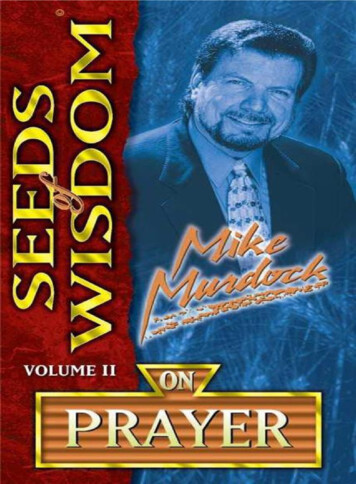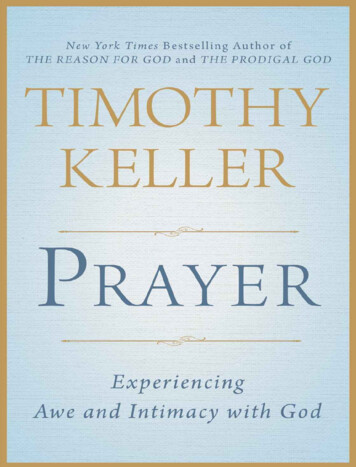
Transcription
A LSO BY TIMOTHY KELLERTHE REASON FOR GOD: Belief in an Age of SkepticismTHE PRODIGAL GOD: Recovering the Heart of the ChristianFaithCOUNTERFEIT GODS: The Empty Promises of Money, Sex,and Power, and the Only Hope That MattersGENEROUS JUSTICE: How God’s Grace Makes Us JustJESUS THE KING: Understanding the Life and Death of theSon of GodTHE MEANING OF MARRIAGE: Facing the Complexities ofCommitment with the Wisdom of GodEVERY GOOD ENDEAVOR: Connecting Your Work to God’sWorkWALKING WITH GOD THROUGH PAIN AND SUFFERINGENCOUNTERS WITH JESUS: Unexpected Answers to Life’sBiggest Questions
Published by the Penguin Group Penguin Group (USA) LLC375 Hudson StreetNew York, New York 10014USA Canada UK Ireland Australia New Zealand India South Africa China penguin.comA Penguin Random House Company Copy right 2014 by Timothy Keller Penguin supportscopy right. Copy right fuels creativity, encourages diverse voices, promotes free speech, and creates avibrant culture. Thank y ou for buy ing an authorized edition of this book and for comply ing withcopy right laws by not reproducing, scanning, or distributing any part of it in any form withoutpermission. You are supporting writers and allowing Penguin to continue to publish books for everyreader.All Bible references are from the New International Version (NIV), unless otherwise noted.LIBRARY OF CONGRESS CATALOGING-IN-PUBLICATION DATA has been applied for.ISBN 978-0-69816140-5While the author has made every effort to provide accurate telephone numbers, Internet addresses,and other contact information at the time of publication, neither the publisher nor the author assumesany responsibility for errors or for changes that occur after publication. Further, the publisher does nothave any control over and does not assume any responsibility for author or third-party websites ortheir content.
To Dick Kaufmann, friend and man of prayer
CONTENTSAlso by Timothy KellerTitle PageCopyrightDedicationIntroduction: Why Write a Book on Prayer?P ART ONEDesiring PrayerONEThe Necessity of PrayerTWOThe Greatness of PrayerP ART TWOUnderstanding PrayerTHREEWhat Is Prayer?
FOURConversing with GodFIVEEncountering GodP ART THREELearning PrayerSIXLetters on PrayerSEVENRules for PrayerEIGHTThe Prayer of PrayersNINEThe Touchstones of PrayerP ART FOURDeepening PrayerTENAs Conversation: Meditating on His WordELEVENAs Encounter: Seeking His Face
P ART FIVEDoing PrayerTWELVEAwe: Praising His GloryTHIRTEENIntimacy: Finding His GraceFOURTEENStruggle: Asking His HelpFIFTEENPractice: Daily PrayerAppendix: Some Other Patterns for Daily PrayerAcknowledgmentsSelected Annotated Bibliography on PrayerNotesAbout the Author
IntroductionWhy Write a Book on Prayer?Some years ago I realized that, as a pastor, I didn’t have afirst book to give someone who wanted to understandand practice Christian prayer. This doesn’t mean there aren’tgreat books on prayer. Many older works are immeasurablywiser and more penetrating than anything I could possiblyproduce. The best material on prayer has been written.Yet many of these excellent books are written in an archaicidiom inaccessible to most contemporary readers. In additionthey tend to be primarily theological or devotional or practical,but seldom do they combine the theological, experiential, andmethodological all under one cover.1 A book on the essentialsof prayer should treat all three. Also, nearly all the classicbooks on prayer spend a fair amount of time warning readersabout practices in their day that were spiritually unhelpful oreven damaging. Such cautions must be updated for readersliving in each generation.Two Kinds of Prayer?
Recent writers on prayer tend to have one of two views on thesubject. Most now emphasize prayer as a means to experienceGod’s love and to know oneness with him. They promise a lifeof peace and of continual resting in God. Such authors oftengive radiant testimonies of feeling regularly surrounded by thedivine presence. Other books, however, see the essence ofprayer not as inward resting but as calling on God to bring inhis kingdom. Prayer is viewed as a wrestling match, often—orperhaps ordinarily—without a clear sense of God’s immediatepresence. One book of this sort is The Still Hour, by AustinPhelps.2 He begins with the premise that a sense of theabsence of God is the norm for the Christian at prayer, and thatthe experience of God’s presence is difficult for most people tofind.Another book with the same approach is Donald G.Bloesch’s The Struggle of Prayer. He criticizes what he calls“Christian mysticism.”3 He resists the teaching that prayer’sultimate goal is personal communion with God. He thinks thismakes prayer a selfish “end in itself.”4 In his view, the highestaim of prayer is not peaceful reflection but fervent supplicationfor the kingdom of God to come to fruition in the world and inour own lives. The ultimate aim of prayer is “obedience toGod’s will, not the contemplation of his being.”5 Prayer is notmainly for an inner state but for conformity to God’s purposes.What accounts for these two views—what we could call“communion-centered” and “kingdom-centered” prayer? Oneexplanation is that they reflect people’s actual experience. Somediscover that their emotions are unresponsive toward God andthat even paying attention in prayer for more than a fewminutes is extremely difficult. Others regularly experience afeeling of God’s presence. This accounts at least in part for the
different views. However, theological differences also play arole. Bloesch argues that mystical prayer fits more with theCatholic view that God’s grace is infused directly into usthrough baptism and the Mass rather than with the Protestantbelief that we are saved through faith in God’s word of gospelpromise.6Which view of prayer is the better one? Is peacefuladoration or assertive supplication the ultimate form of prayer?That question assumes that the answer is completely either-or,which is unlikely.Communion and KingdomFor help, we should turn first to the Psalms, the inspired prayerbook of the Bible. There we see that both experiences of prayerare well represented. There are Psalms such as Psalm 27, 63, 84,131, and the “long hallelujah” of Psalms 146–150 that depictadoring communion with God. In Psalm 27:4, David says thatthere is one primary thing he asks of the Lord in prayer—“togaze on the beauty of the Lord.” While David did in fact prayfor other things, he means at the very least that nothing isbetter than to know the presence of God. Therefore he says: “OGod . . . my soul thirsts for you. . . . I have seen you in thesanctuary and beheld your power and your glory. Becauseyour love is better than life, I will praise you” (Ps 63:1–3).When he adores God in his presence, he says his “soul issatisfied as with the richest of foods” (Ps 63:5). This is indeedcommunion with God.
There are, however, even more Psalms of complaint, of criesfor help, and of calls for God to exercise his power in the world.There are also stark expressions of the experience of God’sabsence. Here we indeed see prayer as a struggle. Psalms 10,13, 39, 42–43, and 88 are just a very few examples. Psalm 10begins asking why God “stands far off” and “hides” himself intimes of trouble. Suddenly the author cries, “Arise, Lord! Liftup your hand, O God. Do not forget the helpless” (Ps 10:12).Yet then he seems to speak almost to himself as well as to theLord. “But you, O God, do see trouble and grief. You considerit to take it to hand. . . . You are the helper of the fatherless” (Ps10:14). The prayer ends with the psalmist bowing to God’stiming and wisdom in all matters yet still fiercely calling out forjustice on the earth. This is the wrestling match of kingdomcentered prayer. The Psalter, then, affirms both the communionseeking and kingdom-seeking kinds of prayer.Besides looking at the actual prayers of the Bible, weshould consider also the Scripture’s theology of prayer—thereasons in God and in our created nature that human beings areable to pray. We are told that Jesus Christ stands as ourmediator so that we, though undeserving in ourselves, canboldly approach God’s throne and cry out for our needs to bemet (Heb 4:14–16; 7:25). We are also told that God himselfdwells within us through the Spirit (Rom 8:9–11) and helps usto pray (Rom 8:26–27) so that even now by faith we may gazeand contemplate the glory of Christ (2 Cor 3:17–18). Thus theBible gives us theological support for both communioncentered and kingdom-centered prayer.A little reflection will show us that these two kinds of prayerare neither opposites nor even discrete categories. AdoringGod is shot through with supplication. To praise God is to pray
“hallowed be thy name,” to ask him to show the world his gloryso that all would honor him as God. Yet just as adorationcontains supplication, so seeking God’s kingdom must includeprayer to know God himself. The Westminster ShorterCatechism tells us that our purpose is to “glorify God andenjoy him forever.” In this famous sentence we see reflectedboth kingdom-prayer and communion-prayer. Those two things—glorifying God and enjoying God—do not always coincide inthis life, but in the end they must be the same thing. We maypray for the coming of God’s kingdom, but if we don’t enjoyGod supremely with all our being, we are not truly honoringhim as Lord.7Finally, when we consult many of the greatest of the olderwriters on prayer—such as Augustine, Martin Luther, andJohn Calvin—we see that they do not fall neatly into eithercamp.8 Indeed, even the prominent Catholic theologian HansUrs von Balthasar has sought to bring balance to the mystical,contemplative prayer tradition. He warns against turninginward too much. “Contemplative prayer . . . neither can norshould be self-contemplation, but [rather] a reverent regard andlistening to . . . the Not-me, namely, the Word of God.”9Through Duty to DelightWhere, then, does this leave us? We should not drive a wedgebetween seeking personal communion with God and seekingthe advance of his kingdom in hearts and in the world. And ifthey are kept together, then communion will not be just
wordless mystical awareness on the one hand, and ourpetitions will not be a way of procuring God’s favor “for ourmany words” (Matt 6:7) on the other.This book will show that prayer is both conversation andencounter with God. These two concepts give us a definitionof prayer and a set of tools for deepening our prayer lives. Thetraditional forms of prayer—adoration, confession,thanksgiving, and supplication—are concrete practices as wellas profound experiences. We must know the awe of praisinghis glory, the intimacy of finding his grace, and the struggle ofasking his help, all of which can lead us to know the spiritualreality of his presence. Prayer, then, is both awe and intimacy,struggle and reality. These will not happen every time we pray,but each should be a major component of our prayer over thecourse of our lives.J. I. Packer and Carolyn Nystrom’s book on prayer has asubtitle that sums all this up nicely. Prayer is “Finding Our Waythrough Duty to Delight.” That is the journey of prayer.
PART ONEDesiring Prayer
ONEThe Necessity of Prayer“We’re Not Going to Make It”In the second half of my adult life, I discovered prayer. I hadto.In the fall of 1999, I taught a Bible study course on thePsalms. It became clear to me that I was barely scratching thesurface of what the Bible commanded and promised regardingprayer. Then came the dark weeks in New York after 9/11, whenour whole city sank into a kind of corporate clinical depression,even as it rallied. For my family the shadow was intensified asmy wife, Kathy, struggled with the effects of Crohn’s disease.Finally, I was diagnosed with thyroid cancer.At one point during all this, my wife urged me to dosomething with her we had never been able to muster the selfdiscipline to do regularly. She asked me to pray with her everynight. Every night. She used an illustration that crystallized herfeelings very well. As we remember it, she said something likethis:
Imagine you were diagnosed with such a lethalcondition that the doctor told you that you woulddie within hours unless you took a particularmedicine—a pill every night before going to sleep.Imagine that you were told that you could nevermiss it or you would die. Would you forget?Would you not get around to it some nights? No—it would be so crucial that you wouldn’t forget,you would never miss. Well, if we don’t praytogether to God, we’re not going to make itbecause of all we are facing. I’m certainly not. Wehave to pray, we can’t let it just slip our minds.Maybe it was the power of the illustration, maybe it was justthe right moment, maybe it was the Spirit of God. Or, most likelyof all, it was the Spirit of God using the moment and the clarityof the metaphor. For both of us the penny dropped; we realizedthe seriousness of the issue, and we admitted that anythingthat was truly a nonnegotiable necessity was something wecould do. That was more than twelve years ago, and Kathy andI can’t remember missing a single evening of praying together,at least by phone, even when we’ve been apart in differenthemispheres.Kathy’s jolting challenge, along with my own growingconviction that I just didn’t get prayer, led me into a search. Iwanted a far better personal prayer life. I began to read widelyand experiment in prayer. As I looked around, I quickly came tosee that I was not alone.
“Can’t Anyone Teach Me to Pray?”When Flannery O’Connor, the famous Southern writer, wastwenty-one years old and studying writing in Iowa, she soughtto deepen her prayer life. She had to.In 1946 she began keeping a handwritten prayer journal. Init she describes her struggles to be a great writer. “I want verymuch to succeed in the world with what I want to do. . . . I amso discouraged about my work. . . . Mediocrity is a hard wordto apply to oneself . . . yet it is impossible not to throw it atmyself. . . . I have nothing to be proud of yet myself. I amstupid, quite as stupid as the people I ridicule.” These kinds ofdeclarations can be found in the journal of any aspiring artist,but O’Connor did something different with these feelings. Sheprayed them. Here she followed a very ancient path, as did thepsalmists in the Old Testament, who did not merely identify,express, and vent their feelings but also processed them withbrutal honesty in God’s presence. O’Connor wrote ofeffort at artistry in this rather than thinking of Youand feeling inspired with the love I wish I had.Dear God, I cannot love Thee the way I want to.You are the slim crescent of a moon that I see andmy self is the earth’s shadow that keeps me fromseeing all the moon . . . what I am afraid of, dearGod, is that my self shadow will grow so large thatit blocks the whole moon, and that I will judgemyself by the shadow that is nothing. I do notknow You God because I am in the way.10
Here O’Connor recognizes what Augustine saw clearly inhis own prayer journal, the Confessions—that living welldepended on the reordering of our loves. To love our successmore than God and our neighbor hardens the heart, making usless able to feel and to sense. That, ironically, makes us poorerartists. Therefore, because O’Connor was a writer ofextraordinary gifts who could have become haughty and selfabsorbed, her only hope was in the constant soul reorientationof prayer. “Oh God please make my mind clear. Please make itclean. . . . Please help me to get down under things and findwhere You are.”11She reflected on the discipline of writing out her prayers inthe journal. She recognized the problem of the form. “I havedecided this is not much as a direct medium of prayer. Prayer isnot even as premeditated as this—it is of the moment and thisis too slow for the moment.”12 Then there was the danger thatwhat she was writing down wasn’t really prayer but ventilation.“I . . . want this to be . . . something in praise of God. It isprobably more liable to being therapeutical . . . with the elementof self underlying its thoughts.”13Yet with the journal she believed, “I have started on a newphase of my spiritual life . . . the throwing off of certainadolescent habits and habits of mind. It does not take much tomake us realize what fools we are, but the little it takes is longin coming. I see my ridiculous self by degrees.”14 O’Connorlearned that prayer is not simply the solitary exploration ofyour own subjectivity. You are with Another, and he is unique.God is the only person from whom you can hide nothing.Before him you will unavoidably come to see yourself in a new,unique light. Prayer, therefore, leads to a self-knowledge that isimpossible to achieve any other way.
Cutting through everything else in O’Connor’s journal wasa simple longing to learn truly how to pray. She knewintuitively that prayer was the key to everything else sheneeded to do and to be in life. She wasn’t content with theperfunctory religious observances of her past. “I do not meanto deny the traditional prayers I have said all my life; but I havebeen saying them and not feeling them. My attention is alwaysfugitive. This way I have it every instant. I can feel a warmth oflove beating me when I think and write this to You. Please donot let the explanations of the psychologists about this make itturn suddenly cold.”15At the end of one entry, she simply called out, “Can’tanyone teach me how to pray?”16 Millions of people today areasking the same question. There is a sense of the necessity ofprayer—we have to pray. But how?A Confusing LandscapeAcross Western society an interest has been growing inspirituality, meditation, and contemplation that began ageneration ago, perhaps inaugurated by the highly publicizedinterest of the Beatles in Eastern forms of meditation and fueledby the decline of institutional religion. Fewer and fewer peopleknow the routine of regular religious services, yet some kind ofspiritual craving remains. Today no one blinks to read apassing reference in a New York Times article that RobertHammond, one of the founders of the High Line urban park inthe Western Chelsea neighborhood of Manhattan, is going to
India for a three-month meditation retreat.17 Scores ofWesterners flood to ashrams and other spiritual retreat centersin Asia every year.18 Rupert Murdoch recently tweeted that hewas learning Transcendental Meditation. “Everyonerecommends,” he said. “Not that easy to get started, but saidto improve everything!”19Within the Christian church, there has been a similarexplosion of interest in prayer. There is a strong movementtoward ancient meditation and contemplative practices. Wenow have a small empire of institutions, organizations,networks, and practitioners that teaches and coaches inmethods such as centering prayer, contemplative prayer,“listening” prayer, lectio divina, and many others of what arenow called “spiritual disciplines.”20All this interest should not be characterized as a single,coherent “wave,” however. Rather, it is a set of powerfulcrosscurrents causing dangerously choppy waters for manyinquirers. There have been substantial criticisms lodgedagainst much of the new emphasis on contemplativespirituality, within both the Catholic and Protestant churches.21As I looked around for resources to help me with my prayer lifeas well as others’, I saw how confusing the landscape was.“An Intelligent Mysticism”The way forward for me came by going back to my ownspiritual-theological roots. During my first pastorate in Virginia,and then again in New York City, I had the experience of
preaching through St. Paul’s letter to the Romans. In the middleof chapter 8, Paul writes:The Spirit you received does not make you slaves,so that you live in fear again; rather, the Spirit youreceived brought about your adoption to sonship.And by him we cry, “Abba, Father.” The Spirithimself testifies with our spirit that we are God’schildren. (vv. 15–16)The Spirit of God assures us of God’s love. First, the Spiritenables us to approach and cry to the great God as our lovingfather. Then he comes alongside our spirit and adds a moredirect testimony. I first came to grips with these verses byreading the sermons of D. Martyn Lloyd-Jones, a Britishpreacher and author of the mid-twentieth century. He made thecase that Paul was writing about a profound experience ofGod’s reality.22 Eventually I found that most modern biblicalcommentators generally agreed that these verses describe, asone New Testament scholar put it, “a religious experience thatis ineffable” because the assurance of secure love in God is“mystical in the best sense of the word.” Thomas Schreineradds that we must not “underemphasize the emotional ground”of experience. “Some veer away from this idea because of itssubjectivity, but the abuse of the subjective in some circlescannot exclude the ‘mystical’ and emotional dimensions ofChristian experience.”23Lloyd-Jones’s exposition also pointed me back to writers Ihad read in seminary, such as Martin Luther, John Calvin, theseventeenth-century British theologian John Owen, and the
eighteenth-century American philosopher and theologianJonathan Edwards. There I discovered no choice offeredbetween truth or Spirit, between doctrine or experience. One ofthe most accomplished of the older theologians—John Owen—was especially helpful to me at this point. In a sermon on thegospel, Owen gave due diligence to laying the doctrinalfoundation of Christian salvation. Then, however, he exhortedhis hearers to “get an experience of the power of the gospel . . .in and upon your own hearts, or all your profession is anexpiring thing.”24 This heart experience of the gospel’s powercan happen only through prayer—both publicly in thegathered Christian assembly and privately in meditation.In my pursuit of a deeper prayer life, I chose acounterintuitive course. I deliberately avoided reading any newbooks on prayer at all. Instead, I went back to the historicaltexts of Christian theology that had formed me and beganasking questions about prayer and the experience of God—questions I had not had in my mind very clearly when I studiedthese texts in graduate school decades before. I discoveredmany things I had completely missed. I found guidance on theinward life of prayer and spiritual experience that took mebeyond the dangerous currents and eddies of thecontemporary spirituality debates and movements. One Iconsulted was the Scottish theologian John Murray, whoprovided one of the most helpful insights of all:It is necessary for us to recognize that there is anintelligent mysticism in the life of faith . . . ofliving union and communion with the exalted andever-present Redeemer. . . . He communes with his
people and his people commune with him inconscious reciprocal love. . . . The life of true faithcannot be that of cold metallic assent. It musthave the passion and warmth of love andcommunion because communion with God is thecrown and apex of true religion.25Murray was not a writer given to lyrical passages. Yet whenhe speaks of “mysticism” and “communion” with the one whodied and ever lives for us, he is assuming that Christians willhave a palpable love relationship with him and do have apotential for a personal knowledge and experience of God thatbeggars the imagination. Which, of course, means prayer—butwhat prayer! In the midst of the paragraph, Murray quotesPeter’s first epistle: “Though you have not seen him, you lovehim; and even though you do not see him now, you believe inhim and are filled with an inexpressible and glorious joy.” Theolder King James version calls it “joy unspeakable and full ofglory.” Some translate it “glorified joy beyond words.”26As I pondered that verse, I had to marvel that Peter, inwriting to the church, could address all his readers like this. Hedidn’t say, “Well, some of you with an advanced spiritualityhave begun to get periods of high joy in prayer. Hope the restof you catch up.” No, he assumed that an experience ofsometimes overwhelming joy in prayer was normal. I wasconvicted.One phrase of Murray’s resonated particularly, that we werecalled to an intelligent mysticism. That means an encounterwith God that involves not only the affections of the heart butalso the convictions of the mind. We are not called to choose
between a Christian life based on truth and doctrine or a lifefilled with spiritual power and experience. They go together. Iwas not being called to leave behind my theology and launchout to look for “something more,” for experience. Rather, I wasmeant to ask the Holy Spirit to help me experience my theology.Learning to PrayAs Flannery O’Connor asked so plaintively, how, then, do weactually learn how to pray?In the summer after I was treated successfully for thyroidcancer, I made four practical changes to my life of privatedevotion. First, I took several months to go through thePsalms, summarizing each one. That enabled me to beginpraying through the Psalms regularly, getting through all ofthem several times a year.27 The second thing I did was alwaysto put in a time of meditation as a transitional disciplinebetween my Bible reading and my time of prayer. Third, I did allI could to pray morning and evening rather than only in themorning. Fourth, I began praying with greater expectation.The changes took some time to bear fruit, but aftersustaining these practices for about two years, I began to havesome breakthroughs. Despite ups and downs since then, Ihave found new sweetness in Christ and new bitterness too,because I could now see my heart more clearly in the new lightof vital prayer. In other words, there were more restfulexperiences of love as well as more wrestling to see Godtriumph over evil, both in my own heart and in the world. These
two experiences of prayer we discussed in the introductiongrew together like twin trees. I now believe that is how itshould be. One stimulates the other. The result was a spiritualliveliness and strength that this Christian minister, for all mypreaching, had not had before. The rest of the book is arecounting of what I learned.Prayer is nonetheless an exceedingly difficult subject towrite about. That is not primarily because it is so indefinablebut because, before it, we feel so small and helpless. LloydJones once said that he had never written on prayer because ofa sense of personal inadequacy in this area.28 I doubt, however,that any of the best authors on prayer in history felt moreadequate than Lloyd-Jones did. The early-twentieth-centuryBritish writer P. T. Forsyth expressed my own feeling andaspiration better than I can:It is a difficult and even formidable thing to writeon prayer, and one fears to touch the Ark. . . . Butperhaps also the effort . . . may be graciouslyregarded by Him who ever liveth to makeintercession as itself a prayer to know better howto pray.29Prayer is the only entryway into genuine self-knowledge. Itis also the main way we experience deep change—thereordering of our loves. Prayer is how God gives us so many ofthe unimaginable things he has for us. Indeed, prayer makes itsafe for God to give us many of the things we most desire. It isthe way we know God, the way we finally treat God as God.Prayer is simply the key to everything we need to do and be in
life.We must learn to pray. We have to.
TWOThe Greatness of PrayerFor this reason, ever since I heard about yourfaith in the Lord Jesus and your love for all God’speople, I have not stopped giving thanks for you,remembering you in my prayers. I keep askingthat the God of our Lord Jesus Christ, theglorious Father, may give you the Spirit ofwisdom and revelation, so that you may knowhim better. I pray that the eyes of your heart maybe enlightened in order that you may know thehope to which he has called you, the riches of hisglorious inheritance in his holy people, and hisincomparably great power for us who believe.Ephesians 1:15–19The Supremacy of Prayerquick comparison of this prayer from Ephesians 1 withAthose in Philippians 1, Colossians 1, and later in Ephesians 3
reveals that this is how Paul customarily prayed for those heloved. At the grammatical heart of Paul’s long sentence is astriking insight into the greatness and importance of prayer. Inverse 17 he writes: “I keep asking that . . . you may know himbetter.”It is remarkable that in all of his writings Paul’s prayers forhis friends contain no appeals for changes in theircircumstances. It is certain that they lived in the midst of manydangers and hardships. They faced persecution, death fromdisease, oppression by powerful forces, and separation fromloved ones. Their existence was far less secure than ours istoday. Yet in these prayers you see not one petition for a betteremperor, for protection from marauding armies, or even forbread for the next meal. Paul does not pray for the goods wewould usually have near the top of our lists of requests.Does that mean it would have been wrong to pray for suchthings? Not at all. As Paul knew, Jesus himself invites us to askfor our “daily bread” and that God would “deliver us from evil.”In 1 Timothy 2, Paul directs his readers to pray for peace, forgood government, and for the needs of the world. In his ownprayers, then, Paul is not giving us a universal model for prayerin the same way Jesus did. Rather, in them he reveals what heasked most frequently for his friends—what he believed wasthe most important thing God could give them.What is that? It is—to know him better. Paul explains thiswith color and detail. It means having the “eyes of their hearts . . enlightened” (Ephesians 1:18). Biblically, the heart is thecontrol center of the entire self. It is the repository of one’score commitments, deepest loves, and most foundationalhopes that control our feeling, thinking, and behavior. To havethe “eyes of the heart enlightened” with a particular truth
means to h
THE REASON FOR GOD: Belief in an Age of Skepticism THE PRODIGAL GOD: Recovering the Heart of the Christian Faith COUNTERFEIT GODS: The Empty Promises of Money, Sex, and Power, and the Only Hope That Matters GENEROUS JUSTICE: How God’s Grace Makes Us Just JESUS THE KING: Understand
